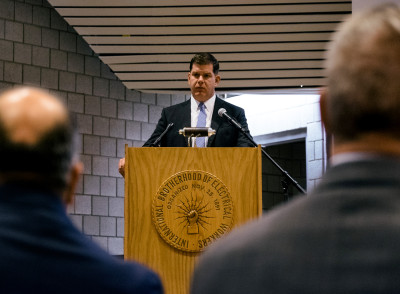
Calling on members of the community to collaborate on how to address drug addiction, Boston Mayor Martin Walsh hosted the inaugural Fighting Addiction in the Hub program Friday morning at the Local 103 IBEW Hall in Dorchester.
The program, dubbed FAITH, aims to educate residents about opioid addiction prevention and recovery. It drew inspiration from the Heroin Education Awareness Task Force run by the Woburn District Court.
“To build continuative care, we need to have continuative partners to make sure that we can make sure there’s no broken chains in the cycle of recovery,” Walsh said to the crowd. “ … This [effort] is one piece of the puzzle. There are many pieces of the puzzle that we need to put together and we need to put the puzzle together.”
Walsh joined Boston Fire Commissioner Joseph Finn and Director of the Office of Recovery Services Jennifer Tracey in his address.
Other speakers included Joanne Peterson, Founder and Executive Director of Learn to Cope, Massachusetts Sen. John Keenan, and Tom Foye of the FBI Safe Streets task force. All of the speakers contributed information to help inform attendees about the importance of substance abuse prevention.
Finn said the fire department could help address the opioid epidemic. BFD was first equipped with Narcan, a drug used to reverse opioid overdose, in 2014, and under the direction of Walsh, firefighters have since administered more than 475 doses of Narcan, he said.
“We are strategically located throughout the city. We have 34 firehouses whose average response time is under four minutes. We also have over 900 nationally certified EMTs,” Finn said in his address. “So the natural capacity exists within the [fire] department to be the front line of this battle.”
Finn said the fire department will launch a new initiative to work with the City’s Employee Assistance Program to make follow-up visits with those to whom the fire department has responded more than once.
“It is our hope along with our other public safety departments, the Boston Police Department and Boston [Emergency Medical Services], that we can make a difference in these families’ lives while going through this horrific crisis,” Finn said.
BPD is also in the process of adopting Narcan, Walsh said.
Walsh emphasized that the opioid crisis is important not just at a city or state level, but also at a nationwide level.
“We need to really make sure that as we talk about this issue, we bring this issue to the forefront,” Walsh said. “Not just in my city [in] Boston, but in every city across the United States of America.”
Last month, Walsh was named the chair of a federal task force on substance abuse prevention, The Daily Free Press reported Oct. 14
Several residents said the city’s efforts to educate the public about substance abuse are crucial to solving the opioid crisis.
Biagio Desimone, 18, of Fenway, said he is glad the mayor is playing a leadership role.
“It’s really great,” he said. “It’s really important that people understand how dangerous [substance abuse] can be. We all need to be aware and work to fix it instead of treating it as a stigmatized issue.”
Paul Luttik, 28, of the South End, said he was pleased Boston leaders are working against substance abuse.
“It’s a great thing,” Luttik said. “It’s important to inform the public and help them understand how important it is. Great idea.”
Luttik also said that he is glad the fire department administers Narcan and hopes the police department will do the same.
Sarah Jung, 29, of Fenway, said that the use of Narcan will be instrumental in decreasing substance abuse.
“At face value, [equipping police with Narcan] seems like a really good idea,” she said. “There could be more to the story that I don’t know about, but I don’t see why not.”
Kennedy serves as a city associate for the Daily Free Press. A freshman, she studies English with a minor in philosophy. As a journalist, Kennedy shows special interest in crime and local politics. You can follow her on Twitter at @stellarkenn.














